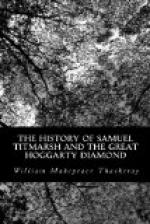Now Mr. B. has not anything to do with my humble story; but I can’t help mentioning him, as I saw him. He sent for his lawyer and his doctor; the former settled speedily his accounts with the bailiff, and the latter arranged all his earthly accounts: for after he went from the spunging-house he never recovered from the shock of the arrest, and in a few weeks he died. And though this circumstance took place many years ago, I can’t forget it to my dying day; and often see the author of Mr. B.’s death,—a prosperous gentleman, riding a fine horse in the Park, lounging at the window of a club; with many friends, no doubt, and a good reputation. I wonder whether the man sleeps easily and eats with a good appetite? I wonder whether he has paid Mr. B.’s heirs the sum which that gentleman paid, and died for?
If Mr. B.’s history has nothing to do with mine, and is only inserted here for the sake of a moral, what business have I to mention particulars of the dinner to which I was treated by that gentleman, in the spunging-house in Cursitor Street? Why, for the moral too; and therefore the public must be told of what really and truly that dinner consisted.
There were five guests, and three silver tureens of soup: viz., mock-turtle soup, ox-tail soup, and giblet soup. Next came a great piece of salmon, likewise on a silver dish, a roast goose, a roast saddle of mutton, roast game, and all sorts of adjuncts. In this way can a gentleman live in a spunging-house if he be inclined; and over this repast (which, in truth, I could not touch, for, let alone having dined, my heart was full of care)—over this meal my friend Gus Hoskins found me, when he received the letter that I had despatched to him.
Gus, who had never been in a prison before, and whose heart failed him as the red-headed young Moses opened and shut for him the numerous iron outer doors, was struck dumb to see me behind a bottle of claret, in a room blazing with gilt lamps; the curtains were down too, and you could not see the bars at the windows; and Mr. B., Mr. Lock the Brighton officer, Mr. Aminadab, and another rich gentleman of his trade and religious persuasion, were chirping as merrily, and looked as respectably, as any noblemen in the land.
“Have him in,” said Mr. B., “if he’s a friend of Mr. Titmarsh’s; for, cuss me, I like to see a rogue: and run me through, Titmarsh, but I think you are one of the best in London. You beat Brough; you do, by Jove! for he looks like a rogue—anybody would swear to him; but you! by Jove, you look the very picture of honesty!”




